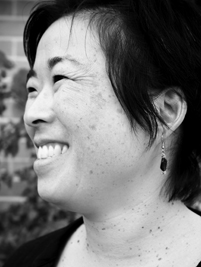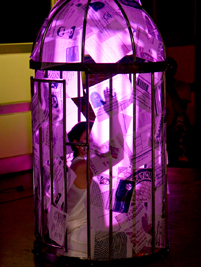POETS & WRITERS IS MORE than a magazine. We are a nonprofit organization that puts money directly into the hands of writers who give readings and lead workshops in museums, prisons, homeless shelters, libraries, and senior centers. Your subscription to Poets & Writers Magazine supports the all-important work of cultivating literary activity in urban and rural communities throughout the United States.
Writing the Body
 They said she was waiting for the bus. When the police approached her, she fled into the local grocery store and hid in the women’s bathroom. When she finally emerged, they asked for proof of residency. She had none. The cops called in Border Patrol and began the process of sending her back to Mexico. The woman was “Brown Waiting for the Bus,” which, if you are undocumented in South Tucson, can get you deported.
They said she was waiting for the bus. When the police approached her, she fled into the local grocery store and hid in the women’s bathroom. When she finally emerged, they asked for proof of residency. She had none. The cops called in Border Patrol and began the process of sending her back to Mexico. The woman was “Brown Waiting for the Bus,” which, if you are undocumented in South Tucson, can get you deported.
I’ve been working in collaboration with Jason Aragon of Pan Left Productions on Dream in Silhouette/Soñar en Siluetas, an interdisciplinary project inspired by interviews with residents of South Tucson. We created the project in honor of the anonymous woman at the bus stop and her unrealized dreams. We are working with the border-activist organization Coalición de Derechos Humanos to conduct interviews and workshops with residents, to provide community space for healing, and to respond to the ongoing deportation crisis.
Support from Poets & Writers’ Readings/Workshops program made it possible for us to present an excerpt of Dream in Silhouette/Soñar en Siluetas at Casa Libre, a grassroots poetry center in the heart of Tucson. I created a stream-of-consciousness text to imagine what dreams, memories, and daily rituals are lost when someone is arrested and sent elsewhere. We sampled audio from an interview with Alex, a South Tucson resident who prefers to give only her first name. Yvonne Montoya performed a series of gestures and movements to Alex’s testimony while video footage of actual nighttime deportations, remixed by Adam Cooper-Terán, was projected over her body. Montoya’s body became a proxy for those deported.
“Every day I pray,” says Alex, “‘Please God, let me make it through this day to pick up my kids from school and pick up my husband.’”
When the body is deported, the evidence is removed. As a writer and performance artist I wanted to keep the body front and center, even in its absence.
 The Japanese American community still bears the marks of racial profiling. My parents and grandparents were among the more than one hundred twenty thousand Americans of Japanese descent imprisoned during World War II. They were placed in “relocation centers” in desolate areas of the United States. The bodies were removed, and thus the evidence erased. When I was young I had nightmares that it would happen to us again. So when I know it’s happening to others, I take it personally.
The Japanese American community still bears the marks of racial profiling. My parents and grandparents were among the more than one hundred twenty thousand Americans of Japanese descent imprisoned during World War II. They were placed in “relocation centers” in desolate areas of the United States. The bodies were removed, and thus the evidence erased. When I was young I had nightmares that it would happen to us again. So when I know it’s happening to others, I take it personally.
Our presentation at Casa Libre is just one of many events in Tucson supported by Poets & Writers. Others include Troubling Tucson, a transgender and genderqueer poetry symposium at Casa Libre; and readings sponsored by feminist publisher Kore Press, avant-garde publisher Chax Press, the University of Arizona’s Poetry Center, and others.
For many of these venues and the writers they present, the body is of foremost concern—whether it’s a woman’s body in wartime, the trans body, or the undocumented one. Perhaps our proximity to the border serves to remind us how the body under surveillance—the body whose legitimacy is constantly in question—must find simple acts of resistance to survive. Witnessing, creating, and retelling our histories keeps the body front and center, provides a literary pushback against oppressive forces in the Southwest, and makes space for new dreams for the future.
Denise Uyehara is a writer and performance artist based in Tucson, Arizona. Her interdisciplinary project, Dream in Silhouette/Soñar en Siluetas, will be presented in its entirety at the Alliance for Global Justice Center in Tucson on January 25. An early presentation of the work was supported by the Poets & Writers’ Readings/Workshops program. Its development and premiere are supported by the MAP Fund and the Tucson Pima Arts Council. Her book, Maps of City & Body: Shedding Light on the Performances of Denise Uyehara, was published in 2004 by Kaya Press.
Photo Credits: Uyehara: Jen Long; JP Westenskow






